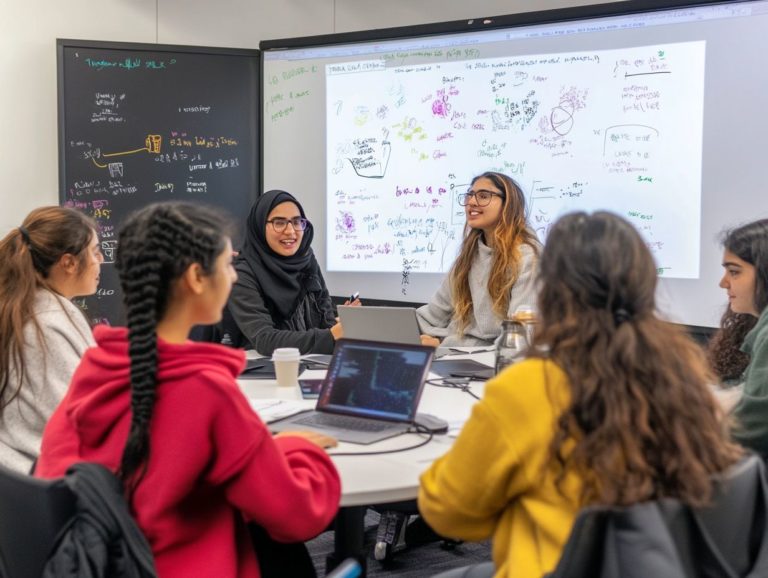The Role of Practice in Language Mastery
Mastering a new language may often seem like an insurmountable challenge, but the true key to success lies in your commitment to consistent practice.
Let s dive into the critical role that practice plays in your language-learning journey. We ll examine the various forms it can take speaking, reading, writing, and listening.
You ll uncover effective tips and strategies to seamlessly integrate practice into your daily routine while tackling common obstacles such as maintaining motivation and overcoming the fear of making mistakes.
Start your exciting journey today! Unlock your language potential and enjoy the learning experience.
Contents
- Key Takeaways:
- The Importance of Practice in Language Learning
- Types of Practice for Language Mastery
- Incorporating Practice into Language Learning
- Overcoming Common Challenges in Practice
- Motivation and Consistency
- Fear of Making Mistakes
- Frequently Asked Questions
- What is the role of practice in language mastery?
- How does practice help in language mastery?
- How often should one practice to achieve mastery in a language?
- Is it necessary to practice with a native speaker to achieve language mastery?
- Can practice alone lead to language mastery?
- How can one make practice more effective for language mastery?
Key Takeaways:

- Consistent practice is essential for achieving language mastery.
- Incorporating various types of practice, such as speaking, reading, writing, and listening, can improve language skills.
- Overcoming challenges, like lack of motivation and fear of making mistakes, is crucial for successful language practice.
The Importance of Practice in Language Learning
Practicing language skills is crucial in your journey of language learning, as it greatly affects how you learn skills and fosters effective communication, particularly for children.
By committing to consistent practice, you can implement various language strategies that support cognitive development, resulting in improved proficiency in both speaking and understanding language.
Establishing daily routines that include different types of practice deepens language immersion, transforming the language learning experience into a more engaging and rewarding endeavor for children at every stage of development.
How Practice Affects Language Mastery
Practicing your language skills directly influences your mastery of the language, allowing you to enhance both your speaking and understanding abilities through a variety of engaging methods.
For instance, incorporating daily conversations with native speakers can dramatically boost your confidence and fluency. Diving into a range of reading materials be it articles, novels, or poetry can enrich your vocabulary and comprehension.
Using flashcards and language apps helps you remember important language elements.
Exploring varied approaches, such as listening to podcasts or watching films in the target language, not only helps you recognize different accents and dialects but also provides cultural insights that deepen your understanding.
Ultimately, the connection between consistent practice and language proficiency becomes clear as you develop a well-rounded skill set, giving you the power to articulate your thoughts effectively and comprehend others with greater ease.
Types of Practice for Language Mastery
To achieve mastery of a language, it s essential to engage in various types of practice. Each type plays a unique and vital role in enhancing a child’s language development:
- Speaking Practice: Speaking practice is essential for nurturing a child’s expressive language skills. Engaging in conversations with language partners can elevate this practice.
- Reading Practice: Reading various materials can enhance vocabulary and comprehension.
- Writing Practice: Writing exercises help reinforce language skills and foster creativity.
- Listening Practice: Listening to native speakers and diverse media provides insights into pronunciation and cultural context.
By incorporating all these elements, you create a rich tapestry of learning that fosters fluency and comprehension.
Speaking Practice
Speaking practice is essential for nurturing a child’s expressive language skills. You can elevate this through engaging conversations with language partners.
These partners are instrumental, offering valuable dialogue opportunities that allow children to explore new vocabulary and experiment with sentence structures in a nurturing setting.
Activities like storytelling, role-playing, or casual chats about daily happenings can significantly enhance their ability to articulate thoughts.
These interactive experiences foster confidence and sharpen listening skills as children learn to respond to others. Incorporating games that demand verbal communication, such as charades or word association, will further ignite their language development, giving them the power to express themselves more clearly in a variety of social contexts.
Join a language club or pick up a book today!
Reading Practice

Engaging in reading practice sharpens your skills and reinforces your grasp of grammar and comprehension of academic English.
When you immerse yourself in a variety of texts, you encounter diverse sentence structures and vocabulary in context. This significantly aids in internalizing language rules and deepens your understanding of grammar across different contexts, enhancing your overall language proficiency.
Effective strategies include reading aloud. This practice allows you to appreciate the rhythm and structure of the language. Additionally, participating in comprehension exercises encourages critical thinking.
Techniques like summarizing passages and discussing themes can further cement your understanding. This transforms reading into both a practical and enjoyable aspect of language acquisition.
Writing Practice
Writing practice is crucial for mastering grammar rules and developing coherent expressions through techniques like sentence frames and tailored teaching methods.
These practices enhance your language skills and ignite your creativity, enabling you to express your thoughts with clarity and impact.
Incorporating sentence frames provides a structured approach to crafting ideas, making it easier to construct complex sentences and maintain logical flow.
With tailored teaching methods, educators can adjust their approaches to suit various learning styles and abilities. This ensures you progress at your own pace.
This personalized attention boosts your writing skills and builds your confidence in communication, essential for academic success and everyday interactions.
Listening Practice
Listening practice is key to developing your active listening skills, essential for understanding language content and enhancing overall proficiency. This foundational aspect enables you to grasp the nuances, accents, and contextual clues vital for effective real-world communication.
Engaging in activities like listening to podcasts and watching movies provides immersive experiences that significantly strengthen this skill.
Integrating listening exercises into your curriculum can be a game changer. Incorporating targeted tasks, such as summarizing spoken texts, helps students enhance their comprehension and retention.
Promoting engaging materials, like analyzing song lyrics or discussing news reports, keeps students interested and fosters a collaborative learning atmosphere. This makes the language journey enjoyable and effective.
Incorporating Practice into Language Learning
Incorporating practice into your language journey enhances communication skills while fostering a supportive environment that values cultural responsiveness.
Embracing this approach allows for deeper engagement, making the learning experience effective and enriching in every aspect.
Tips and Strategies for Effective Practice
Effective practice strategies can significantly enhance your language learning by integrating everyday objects and using language learning apps to keep you engaged.
To create an immersive experience, stick sticky notes with target language words on your fridge and other common household items. This ignites curiosity and reinforces vocabulary in an enjoyable manner.
By leveraging language learning apps, you can access interactive exercises that complement these home-based practices, seamlessly incorporating the language into your daily routines.
These tools make learning accessible and boost your motivation, allowing you to track progress and engage with gamified content that aligns with your interests.
Overcoming Common Challenges in Practice

Overcoming common challenges in language practice, like maintaining motivation and conquering the fear of making mistakes, is crucial for unlocking your language skills!
Embracing these obstacles head-on empowers you to unlock your full potential and make meaningful strides in your language journey.
Motivation and Consistency
Maintaining your motivation and consistency is vital for effective language acquisition and ensuring regular daily practice. To achieve this, set realistic, measurable goals that break the language-learning journey into manageable chunks.
By establishing specific, attainable objectives, you create a roadmap to guide your language journey. Tracking your progress through apps, journals, or learning platforms offers a visual representation of your growth, further fueling your motivation.
Surrounding yourself with a supportive community such as language exchange partners or study groups enhances your accountability and makes the journey more enjoyable. This approach keeps you motivated and excited about your learning journey while instilling a sense of achievement at every milestone you reach.
Fear of Making Mistakes
Addressing the fear of making mistakes is crucial in your language learning journey, as it can significantly hinder effective communication and personal growth.
When you feel anxious about making errors, it s natural to withdraw from participating, limiting your opportunities to practice and grow. This fear may arise from psychological barriers, such as perfectionism and fear of judgment.
Instructors can combat this by creating a supportive atmosphere, highlighting that mistakes are part of the learning process. Encouraging group activities and open discussions allows you to share your experiences without fear, fostering a safe space for exploration.
Incorporating reflective practices can empower you to build resilience, helping you view challenges as opportunities for growth rather than setbacks.
Frequently Asked Questions
What is the role of practice in language mastery?
Practice is key to mastering a language.
How does practice help in language mastery?

Practice allows individuals to engage continuously with the language, leading to better retention and understanding of grammar, vocabulary, and sentence structure. It also helps build fluency and confidence in using the language.
How often should one practice to achieve mastery in a language?
The frequency of practice depends on individual needs and goals. It is recommended to practice regularly, at least a few times a week, to see significant progress.
Is it necessary to practice with a native speaker to achieve language mastery?
While practicing with a native speaker can be beneficial, it is not a requirement for achieving mastery. Consistent practice and exposure to the language through various resources can also lead to significant improvement.
Can practice alone lead to language mastery?
Practice is crucial, but it is not the only factor. Access to quality resources such as textbooks, online courses, and language exchange programs is also important.
How can one make practice more effective for language mastery?
Start making your practice more effective today! Set specific goals, use various resources, and actively engage with the language. Seeking feedback from a teacher or native speaker can help identify areas that need improvement.






